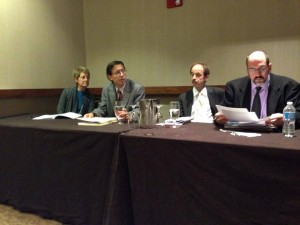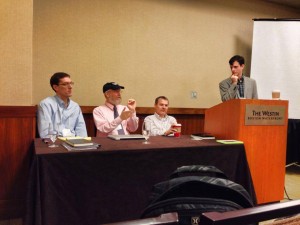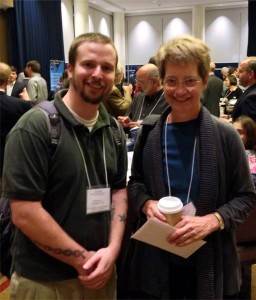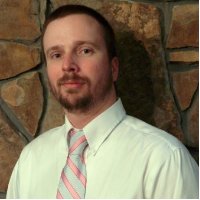 I had the great fortune of attending the 2013 Society for the The Religious Studies Project (RSP). The 2013 SSSR took place in Boston Massachusetts from November 8th – 10th a few blocks away from the Boston Harbor. Luckily, the overall tone of the conference and the attending scholars, were much warmer than the brisk weather outside the doors of the lovely Westin Waterfront Hotel. This conference report seeks to capture the unadulterated energy and excitement of a young scholar new to the social scientific study of religion and invite more established scholars to reflect on their early days in the field.
I had the great fortune of attending the 2013 Society for the The Religious Studies Project (RSP). The 2013 SSSR took place in Boston Massachusetts from November 8th – 10th a few blocks away from the Boston Harbor. Luckily, the overall tone of the conference and the attending scholars, were much warmer than the brisk weather outside the doors of the lovely Westin Waterfront Hotel. This conference report seeks to capture the unadulterated energy and excitement of a young scholar new to the social scientific study of religion and invite more established scholars to reflect on their early days in the field.
Eight AM bright and early the first day of the conference drew my attention to a session on “New Religious Movements” that featured a presentation by a former RSP podcast respondent Dusty Hoesly assessing the possibility of the Universal Life Church (ULC) as a new religious movement. I was surprised to learn that Hoesly’s presentation was, as far as he could tell, one of the first scholarly looks at the ULC group from academia. He provided some interesting data on Kirby J. Hensley, the founder of the ULC. According to Dusty, one of Hensley’s central concerns in founding the ULC was to demonstrate the ‘absurdity’ of governments giving religious organizations tax-exempt status in the United States. Thus by becoming ordained as a ULC Minister, one could start their own ‘church’ from home and at least in theory be tax-exempt. In the latter part of the morning, Dr. Carissa Sharp spoke about ‘the relationship between religious complexity and pro-sociality’. Dr. Sharp sought to challenge current psychological priming methods in examining the prosociality of religion by introducing the concept of integrative complexity (IC) calling for the need of a deeper level of understanding in the connection between religion and prosociality.

Every seat was full and a row of people stood along the back wall to hear scholars presenting their disciplinary and research perspectives in the social scientific study of religion. Dr. Laurence Iannaccone spoke about looking at religion through an economic lens taking into account the idiosyncrasies that research on religion demands and that economists often ignore arguing for a study of religion and economics in which both contribute to the other. Dr. Gerardo Marti addressed the study of religion from a sociological perspective followed by Dr. Doug Oman (a scholar in the Public Health field) arguing that the boundaries between disciplinary fields are often blurred and can even overlap at times. Dr. Ann Taves was the final panelist. In words that embody her ‘Religious Experience Reconsidered’ approach to religion, she tied together the multiple disciplines represented on the panel and spoke about a careful balancing of what she termed the ‘interdisciplinary hat’, with the ‘discipline hat’ in the study religion from multiple academic perspectives.
Dr. R. Stephen Warner delivered the annual H. Paul Douglass Lecture (sponsored by the RSP podcast by Douglas Pratt that shared a similar ‘tone’. In Warner’s lecture and Pratt’s podcast, both scholars appear to be parsing what can and can not be included in the category of ‘religion’ making them appear as a stable monolith of fixed positive traits, discounting variation among individuals and assigning negative traits to secularity. Warner’s SSSR lecture and Pratt’s podcast problematically essentialise religious identities and appear as a dangerous call for scholars to offer protection for religion in the public sphere instead of simply researching religion (for a further critical response see Beaman, 2013).
 The second day of the conference it was time to attend my first ‘author meets critics’ with a review of former RSP podcast scholar Dr. Ryan T. Cragun’s What You Don’t Know About Religion (but should). Cragun had pen and paper out taking notes while the invited critics, Dr. Michael Nielsen, Dr. Christopher Chiappari and Dr. Rick Phillips, spoke – as good critics do – with both praise and careful critique. Dr. Cragun announced that a follow up book titled “More Of What You Don’t Know About Religion” is currently in the works and it was refreshing to hear him advocate for conducting science that was not just for other academics in a specific field, but also for the public as a whole. Later that day, I attended an organized panel on the “Biological and Evolutionary Aspects of Religion” that featured an informative talk by Dr. Stewart Guthrie outlining “A Biological, Evolutionary, and Cognitive Approach” to religion. Upon conclusion of the panel, I was fortunate to have Dr. Guthrie spend several minutes that day, at two separate times no less, discussing both the cognitive and psychological study of belief and non-belief with me. Dr. Guthrie clearly understands what it means to a young student such as me when they get to not only ask questions from a top scholar, but also get asked questions back! This teaching style certainly builds bridges and seems to be indicative of the commitment the SSSR has towards fostering relationships between students and scholars. In fact, the theme according to the Dr. Christopher F. Silver, as the Graduate Student Representative for 2014, and RSP podcast interviewee Dr. Ralph W. Hood Jr. as the Program Chair, this theme of mentorship and collaboration seems to be a something that we can expect to continue into the next year.
The second day of the conference it was time to attend my first ‘author meets critics’ with a review of former RSP podcast scholar Dr. Ryan T. Cragun’s What You Don’t Know About Religion (but should). Cragun had pen and paper out taking notes while the invited critics, Dr. Michael Nielsen, Dr. Christopher Chiappari and Dr. Rick Phillips, spoke – as good critics do – with both praise and careful critique. Dr. Cragun announced that a follow up book titled “More Of What You Don’t Know About Religion” is currently in the works and it was refreshing to hear him advocate for conducting science that was not just for other academics in a specific field, but also for the public as a whole. Later that day, I attended an organized panel on the “Biological and Evolutionary Aspects of Religion” that featured an informative talk by Dr. Stewart Guthrie outlining “A Biological, Evolutionary, and Cognitive Approach” to religion. Upon conclusion of the panel, I was fortunate to have Dr. Guthrie spend several minutes that day, at two separate times no less, discussing both the cognitive and psychological study of belief and non-belief with me. Dr. Guthrie clearly understands what it means to a young student such as me when they get to not only ask questions from a top scholar, but also get asked questions back! This teaching style certainly builds bridges and seems to be indicative of the commitment the SSSR has towards fostering relationships between students and scholars. In fact, the theme according to the Dr. Christopher F. Silver, as the Graduate Student Representative for 2014, and RSP podcast interviewee Dr. Ralph W. Hood Jr. as the Program Chair, this theme of mentorship and collaboration seems to be a something that we can expect to continue into the next year.
The final day of the conference I attended a session on teaching psychology of religion titled “Psychological Approaches to Understanding Religion”. One of the panelist, Dr. Kevin Ladd (RSP podcast on the psychology of prayer with Dr. Ladd coming soon), shared a hands on approach he uses to both demonstrate the problems scholars have defining religion, and to give undergraduates practical experience dealing with real problems researchers encounter. He has each student come up with an operational definition of religion to use for research and then to compare with each other student – obviously they can and do vary greatly. This way, students also gain practical experience navigating the discourse in the study of religion as well.

The final session, titled ‘Atheist Worldviews and Communities’ was the culmination of the conference and resulted in dialectic between the scholars and those attending for the final twenty-five minutes. If the seat count on the last day of an academic conference – at the very last panel no less (which people commonly skip out on attempting to get a head start to the airport) – is any indication of the burgeoning interest in a topic then I dare not say what is and there was a quite an audience for this panel! Scholars from sociology, religious studies and psychology brought together multiple perspectives on current atheism research around the United States. An important quote that has guided my studies comes from psychologist of religion Antoine Vergote on the importance of looking at not only studying belief but also un-belief for “one cannot be understood without the other” (1997). What a way to end a conference – with an engaging conversation on the importance of new directions in research!
*The next Society for the Scientific Study of Religion conference will be held October 31-November 2, 2014 in Indianapolis, Indiana.
References
Vergote, A. (1997). Religion, belief and unbelief: A psychological study (Vol. 5). Leuven University Press.



